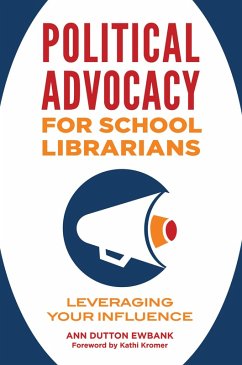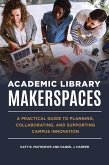31,95 €
31,95 €
inkl. MwSt.
Sofort per Download lieferbar

16 °P sammeln
31,95 €
Als Download kaufen

31,95 €
inkl. MwSt.
Sofort per Download lieferbar

16 °P sammeln
Jetzt verschenken
Alle Infos zum eBook verschenken
31,95 €
inkl. MwSt.
Sofort per Download lieferbar
Alle Infos zum eBook verschenken

16 °P sammeln
- Format: PDF
- Merkliste
- Auf die Merkliste
- Bewerten Bewerten
- Teilen
- Produkt teilen
- Produkterinnerung
- Produkterinnerung

Bitte loggen Sie sich zunächst in Ihr Kundenkonto ein oder registrieren Sie sich bei
bücher.de, um das eBook-Abo tolino select nutzen zu können.
Hier können Sie sich einloggen
Hier können Sie sich einloggen
Sie sind bereits eingeloggt. Klicken Sie auf 2. tolino select Abo, um fortzufahren.

Bitte loggen Sie sich zunächst in Ihr Kundenkonto ein oder registrieren Sie sich bei bücher.de, um das eBook-Abo tolino select nutzen zu können.
School librarians are prepared to be leaders and can use their strengths to advocate for policy that benefits school libraries. This book will teach you how to engage elected officials to effect change that extends to your library. Education and information policy has a direct impact on school libraries and is shaped by decisions at the local, state, and federal levels. School librarians are positioned uniquely to leverage their inside knowledge of effective school library programs to make a difference in education through civic engagement; however, a thorough understanding of both the…mehr
- Geräte: PC
- mit Kopierschutz
- eBook Hilfe
- Größe: 1.04MB
Andere Kunden interessierten sich auch für
![School Librarians and the Technology Department (eBook, PDF) School Librarians and the Technology Department (eBook, PDF)]() Mary Ann BellSchool Librarians and the Technology Department (eBook, PDF)31,95 €
Mary Ann BellSchool Librarians and the Technology Department (eBook, PDF)31,95 €![Technology Handbook for School Librarians (eBook, PDF) Technology Handbook for School Librarians (eBook, PDF)]() William O. ScheerenTechnology Handbook for School Librarians (eBook, PDF)42,95 €
William O. ScheerenTechnology Handbook for School Librarians (eBook, PDF)42,95 €![Positive Classroom Management Skills for School Librarians (eBook, PDF) Positive Classroom Management Skills for School Librarians (eBook, PDF)]() Kay BishopPositive Classroom Management Skills for School Librarians (eBook, PDF)31,95 €
Kay BishopPositive Classroom Management Skills for School Librarians (eBook, PDF)31,95 €![The Elementary School Library Makerspace (eBook, PDF) The Elementary School Library Makerspace (eBook, PDF)]() Marge CoxThe Elementary School Library Makerspace (eBook, PDF)31,95 €
Marge CoxThe Elementary School Library Makerspace (eBook, PDF)31,95 €![The Pivotal Role of Academic Librarians in Digital Learning (eBook, PDF) The Pivotal Role of Academic Librarians in Digital Learning (eBook, PDF)]() Melissa N. MallonThe Pivotal Role of Academic Librarians in Digital Learning (eBook, PDF)39,95 €
Melissa N. MallonThe Pivotal Role of Academic Librarians in Digital Learning (eBook, PDF)39,95 €![Academic Library Makerspaces (eBook, PDF) Academic Library Makerspaces (eBook, PDF)]() Katy B. MathuewsAcademic Library Makerspaces (eBook, PDF)48,95 €
Katy B. MathuewsAcademic Library Makerspaces (eBook, PDF)48,95 €![School Library Makerspaces in Action (eBook, PDF) School Library Makerspaces in Action (eBook, PDF)]() School Library Makerspaces in Action (eBook, PDF)35,95 €
School Library Makerspaces in Action (eBook, PDF)35,95 €-
-
-
School librarians are prepared to be leaders and can use their strengths to advocate for policy that benefits school libraries. This book will teach you how to engage elected officials to effect change that extends to your library. Education and information policy has a direct impact on school libraries and is shaped by decisions at the local, state, and federal levels. School librarians are positioned uniquely to leverage their inside knowledge of effective school library programs to make a difference in education through civic engagement; however, a thorough understanding of both the explicit and "hidden" rules of government is necessary to be an effective advocate. This compact book serves as a guide to advocating for effective programs, filling a gap in the practitioner literature regarding the policies that affect school library programs. Drawing on research-based best practices and the author's experience as the chairman of the ALA Legislation Committee and in political advocacy, this book explains the political process through concrete examples of both success and failure and analyzes these examples to show how librarians can move education policy in a positive direction.
Produktdetails
- Produktdetails
- Verlag: Bloomsbury Publishing Inc
- Seitenzahl: 140
- Altersempfehlung: ab 7 Jahre
- Erscheinungstermin: 15. Januar 2019
- Englisch
- ISBN-13: 9781440863899
- Artikelnr.: 68184232
- Verlag: Bloomsbury Publishing Inc
- Seitenzahl: 140
- Altersempfehlung: ab 7 Jahre
- Erscheinungstermin: 15. Januar 2019
- Englisch
- ISBN-13: 9781440863899
- Artikelnr.: 68184232
- Herstellerkennzeichnung Die Herstellerinformationen sind derzeit nicht verfügbar.
Ann Dutton Ewbank is associate professor at Montana State University, Bozeman. She researches school library advocacy and is a member-leader in the American Library Association.
Foreword by Kathi Kromer Acknowledgments Introduction Chapter 1 Is School
Librarianship Political? Introduction: This We Believe. You Have Knowledge
and Expertise You Are a Leader Layers of the Onion: Education Policy at the
Local, State, and Federal Levels Explicit and Hidden Rules Grassroots and
Grasstops Questions and Activities to Extend Your Learning Chapter 2 What
Is Political Advocacy? Introduction The Nature of Representative Democracy
Your Role in Government Politicians Are People Too Step Out of Your Comfort
Zone Make a Difference Conclusion: The Greater Good Questions and
Activities to Extend Your Learning Chapter 3 The Power of Persuasion
Introduction: What Is Persuasion? Persuasive Messages Persuasion: Four
Perspectives The Relational Perspective The Psychological Perspective The
Linguistic Perspective The Systems Perspective Political Behavior The
System Increasing Your Ability to Persuade A Continuum:
Adversary-Indifference-Ally A Note on Systems Conclusion: Becoming
Persuasive Questions and Activities to Extend Your Learning Chapter 4 A
Primer on Education Governance Introduction Education Governance and the
Tenth Amendment Levels of Education Governance Federal State Charter
Schools Local Conclusion: Discover Your Context Questions and Activities to
Extend Your Learning Chapter 5 Local Political Advocacy Introduction Public
School Districts and Policy Generation School Boards The Intersection of
School Boards and the District Superintendent The Role of the Community
Parents Community Members without Children Site-Based Management Resident
and Nonresident Employees Community Organizations Businesses Advocacy
Groups Leveraging Your Local Union or Professional Association Unions
Professional Associations Questions and Activities to Extend Your Learning:
Case Studies Case Study 1: School District Policy Change Case Study 2:
Collective Bargaining Case Study 3: Bond Election Chapter 6 State Political
Advocacy Introduction Working with the Legislature Legislators Legislative
Staff Working with the Executive Branch Governor's Office State Departments
of Education, State Libraries, and Other Agencies Leveraging State
Professional Associations Coalitions Strategies Questions and Activities to
Extend Your Learning: Case Studies Case Study 1: Opposition to a Bill Case
Study 2: Administrative Rule Amendment Case Study 3: Statewide Databases
Chapter 7 Federal Political Advocacy Introduction Working with Congress
House of Representatives Senate Checks and Balances Capitol Hill Visits
Field Office Visits Working with the Executive Branch Office of the
President U.S. Department of Education Institute of Education Sciences
Office of Educational Technology Office of English Language Acquisition
Office of Elementary and Secondary Education Institute of Museum and
Library Services Other Federal Agencies Bureau of Indian Education
Department of Defense Education Activity Office Federal Communications
Commission National Professional Associations Advocacy Agendas and
Strategies Lobbyists Advocacy Alerts Washington D.C. Legislative Days and
Fly-Ins Strategies Conclusion Questions and Activities to Extend Your
Learning: Case Studies Case Study 1: Federal Grants Case Study 2:
Nonlibrary Professional Association Case Study 3: Appropriations Advocacy
Alert Chapter 8 Political School Library Advocacy: Success, Failure, and
the Future Introduction Political Advocacy: A Long Game Long-Range Planning
Successes and Failures: What to Do Next Avoiding Burnout Advocating for the
Library Ecosystem Public Libraries Academic Libraries Coalition Building
How Political Coalitions Develop and Operate Core and Secondary Policy
Beliefs: Negotiation and Compromise Becoming a Boundary Spanner Developing
Political Advocates Providing Professional Development Incorporating
Political Advocacy into School Librarian Preparation Programs Conclusion
Questions and Activities to Extend Your Learning References Index
Librarianship Political? Introduction: This We Believe. You Have Knowledge
and Expertise You Are a Leader Layers of the Onion: Education Policy at the
Local, State, and Federal Levels Explicit and Hidden Rules Grassroots and
Grasstops Questions and Activities to Extend Your Learning Chapter 2 What
Is Political Advocacy? Introduction The Nature of Representative Democracy
Your Role in Government Politicians Are People Too Step Out of Your Comfort
Zone Make a Difference Conclusion: The Greater Good Questions and
Activities to Extend Your Learning Chapter 3 The Power of Persuasion
Introduction: What Is Persuasion? Persuasive Messages Persuasion: Four
Perspectives The Relational Perspective The Psychological Perspective The
Linguistic Perspective The Systems Perspective Political Behavior The
System Increasing Your Ability to Persuade A Continuum:
Adversary-Indifference-Ally A Note on Systems Conclusion: Becoming
Persuasive Questions and Activities to Extend Your Learning Chapter 4 A
Primer on Education Governance Introduction Education Governance and the
Tenth Amendment Levels of Education Governance Federal State Charter
Schools Local Conclusion: Discover Your Context Questions and Activities to
Extend Your Learning Chapter 5 Local Political Advocacy Introduction Public
School Districts and Policy Generation School Boards The Intersection of
School Boards and the District Superintendent The Role of the Community
Parents Community Members without Children Site-Based Management Resident
and Nonresident Employees Community Organizations Businesses Advocacy
Groups Leveraging Your Local Union or Professional Association Unions
Professional Associations Questions and Activities to Extend Your Learning:
Case Studies Case Study 1: School District Policy Change Case Study 2:
Collective Bargaining Case Study 3: Bond Election Chapter 6 State Political
Advocacy Introduction Working with the Legislature Legislators Legislative
Staff Working with the Executive Branch Governor's Office State Departments
of Education, State Libraries, and Other Agencies Leveraging State
Professional Associations Coalitions Strategies Questions and Activities to
Extend Your Learning: Case Studies Case Study 1: Opposition to a Bill Case
Study 2: Administrative Rule Amendment Case Study 3: Statewide Databases
Chapter 7 Federal Political Advocacy Introduction Working with Congress
House of Representatives Senate Checks and Balances Capitol Hill Visits
Field Office Visits Working with the Executive Branch Office of the
President U.S. Department of Education Institute of Education Sciences
Office of Educational Technology Office of English Language Acquisition
Office of Elementary and Secondary Education Institute of Museum and
Library Services Other Federal Agencies Bureau of Indian Education
Department of Defense Education Activity Office Federal Communications
Commission National Professional Associations Advocacy Agendas and
Strategies Lobbyists Advocacy Alerts Washington D.C. Legislative Days and
Fly-Ins Strategies Conclusion Questions and Activities to Extend Your
Learning: Case Studies Case Study 1: Federal Grants Case Study 2:
Nonlibrary Professional Association Case Study 3: Appropriations Advocacy
Alert Chapter 8 Political School Library Advocacy: Success, Failure, and
the Future Introduction Political Advocacy: A Long Game Long-Range Planning
Successes and Failures: What to Do Next Avoiding Burnout Advocating for the
Library Ecosystem Public Libraries Academic Libraries Coalition Building
How Political Coalitions Develop and Operate Core and Secondary Policy
Beliefs: Negotiation and Compromise Becoming a Boundary Spanner Developing
Political Advocates Providing Professional Development Incorporating
Political Advocacy into School Librarian Preparation Programs Conclusion
Questions and Activities to Extend Your Learning References Index
Foreword by Kathi Kromer Acknowledgments Introduction Chapter 1 Is School
Librarianship Political? Introduction: This We Believe. You Have Knowledge
and Expertise You Are a Leader Layers of the Onion: Education Policy at the
Local, State, and Federal Levels Explicit and Hidden Rules Grassroots and
Grasstops Questions and Activities to Extend Your Learning Chapter 2 What
Is Political Advocacy? Introduction The Nature of Representative Democracy
Your Role in Government Politicians Are People Too Step Out of Your Comfort
Zone Make a Difference Conclusion: The Greater Good Questions and
Activities to Extend Your Learning Chapter 3 The Power of Persuasion
Introduction: What Is Persuasion? Persuasive Messages Persuasion: Four
Perspectives The Relational Perspective The Psychological Perspective The
Linguistic Perspective The Systems Perspective Political Behavior The
System Increasing Your Ability to Persuade A Continuum:
Adversary-Indifference-Ally A Note on Systems Conclusion: Becoming
Persuasive Questions and Activities to Extend Your Learning Chapter 4 A
Primer on Education Governance Introduction Education Governance and the
Tenth Amendment Levels of Education Governance Federal State Charter
Schools Local Conclusion: Discover Your Context Questions and Activities to
Extend Your Learning Chapter 5 Local Political Advocacy Introduction Public
School Districts and Policy Generation School Boards The Intersection of
School Boards and the District Superintendent The Role of the Community
Parents Community Members without Children Site-Based Management Resident
and Nonresident Employees Community Organizations Businesses Advocacy
Groups Leveraging Your Local Union or Professional Association Unions
Professional Associations Questions and Activities to Extend Your Learning:
Case Studies Case Study 1: School District Policy Change Case Study 2:
Collective Bargaining Case Study 3: Bond Election Chapter 6 State Political
Advocacy Introduction Working with the Legislature Legislators Legislative
Staff Working with the Executive Branch Governor's Office State Departments
of Education, State Libraries, and Other Agencies Leveraging State
Professional Associations Coalitions Strategies Questions and Activities to
Extend Your Learning: Case Studies Case Study 1: Opposition to a Bill Case
Study 2: Administrative Rule Amendment Case Study 3: Statewide Databases
Chapter 7 Federal Political Advocacy Introduction Working with Congress
House of Representatives Senate Checks and Balances Capitol Hill Visits
Field Office Visits Working with the Executive Branch Office of the
President U.S. Department of Education Institute of Education Sciences
Office of Educational Technology Office of English Language Acquisition
Office of Elementary and Secondary Education Institute of Museum and
Library Services Other Federal Agencies Bureau of Indian Education
Department of Defense Education Activity Office Federal Communications
Commission National Professional Associations Advocacy Agendas and
Strategies Lobbyists Advocacy Alerts Washington D.C. Legislative Days and
Fly-Ins Strategies Conclusion Questions and Activities to Extend Your
Learning: Case Studies Case Study 1: Federal Grants Case Study 2:
Nonlibrary Professional Association Case Study 3: Appropriations Advocacy
Alert Chapter 8 Political School Library Advocacy: Success, Failure, and
the Future Introduction Political Advocacy: A Long Game Long-Range Planning
Successes and Failures: What to Do Next Avoiding Burnout Advocating for the
Library Ecosystem Public Libraries Academic Libraries Coalition Building
How Political Coalitions Develop and Operate Core and Secondary Policy
Beliefs: Negotiation and Compromise Becoming a Boundary Spanner Developing
Political Advocates Providing Professional Development Incorporating
Political Advocacy into School Librarian Preparation Programs Conclusion
Questions and Activities to Extend Your Learning References Index
Librarianship Political? Introduction: This We Believe. You Have Knowledge
and Expertise You Are a Leader Layers of the Onion: Education Policy at the
Local, State, and Federal Levels Explicit and Hidden Rules Grassroots and
Grasstops Questions and Activities to Extend Your Learning Chapter 2 What
Is Political Advocacy? Introduction The Nature of Representative Democracy
Your Role in Government Politicians Are People Too Step Out of Your Comfort
Zone Make a Difference Conclusion: The Greater Good Questions and
Activities to Extend Your Learning Chapter 3 The Power of Persuasion
Introduction: What Is Persuasion? Persuasive Messages Persuasion: Four
Perspectives The Relational Perspective The Psychological Perspective The
Linguistic Perspective The Systems Perspective Political Behavior The
System Increasing Your Ability to Persuade A Continuum:
Adversary-Indifference-Ally A Note on Systems Conclusion: Becoming
Persuasive Questions and Activities to Extend Your Learning Chapter 4 A
Primer on Education Governance Introduction Education Governance and the
Tenth Amendment Levels of Education Governance Federal State Charter
Schools Local Conclusion: Discover Your Context Questions and Activities to
Extend Your Learning Chapter 5 Local Political Advocacy Introduction Public
School Districts and Policy Generation School Boards The Intersection of
School Boards and the District Superintendent The Role of the Community
Parents Community Members without Children Site-Based Management Resident
and Nonresident Employees Community Organizations Businesses Advocacy
Groups Leveraging Your Local Union or Professional Association Unions
Professional Associations Questions and Activities to Extend Your Learning:
Case Studies Case Study 1: School District Policy Change Case Study 2:
Collective Bargaining Case Study 3: Bond Election Chapter 6 State Political
Advocacy Introduction Working with the Legislature Legislators Legislative
Staff Working with the Executive Branch Governor's Office State Departments
of Education, State Libraries, and Other Agencies Leveraging State
Professional Associations Coalitions Strategies Questions and Activities to
Extend Your Learning: Case Studies Case Study 1: Opposition to a Bill Case
Study 2: Administrative Rule Amendment Case Study 3: Statewide Databases
Chapter 7 Federal Political Advocacy Introduction Working with Congress
House of Representatives Senate Checks and Balances Capitol Hill Visits
Field Office Visits Working with the Executive Branch Office of the
President U.S. Department of Education Institute of Education Sciences
Office of Educational Technology Office of English Language Acquisition
Office of Elementary and Secondary Education Institute of Museum and
Library Services Other Federal Agencies Bureau of Indian Education
Department of Defense Education Activity Office Federal Communications
Commission National Professional Associations Advocacy Agendas and
Strategies Lobbyists Advocacy Alerts Washington D.C. Legislative Days and
Fly-Ins Strategies Conclusion Questions and Activities to Extend Your
Learning: Case Studies Case Study 1: Federal Grants Case Study 2:
Nonlibrary Professional Association Case Study 3: Appropriations Advocacy
Alert Chapter 8 Political School Library Advocacy: Success, Failure, and
the Future Introduction Political Advocacy: A Long Game Long-Range Planning
Successes and Failures: What to Do Next Avoiding Burnout Advocating for the
Library Ecosystem Public Libraries Academic Libraries Coalition Building
How Political Coalitions Develop and Operate Core and Secondary Policy
Beliefs: Negotiation and Compromise Becoming a Boundary Spanner Developing
Political Advocates Providing Professional Development Incorporating
Political Advocacy into School Librarian Preparation Programs Conclusion
Questions and Activities to Extend Your Learning References Index







